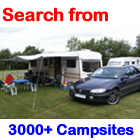You've just arrived at the campsite, and it's not a busy weekend or holiday, so you have a choice of  sites available.
sites available.
These hints should be applied where possible
- The number one rule of campsites is to select your campsite before dark.
- A protective windbreak of trees or bushes in winter camping is essential. Shade and breeze in summer is equally important.
- Inspect the ground for level conditions. Grassy areas are ideal. Avoid rocky or soggy areas, which could be a breeding ground for pests.
- If you have a pitch thats on a hard standing or rocky ground you will need rock pegs for your tent or caravan awning
- Find out the eastern horizon, and face the tent opening toward the morning sun.
- The spot should have good drainage to be free of puddles during heavy rainfall, and should be away from dead timber which may crash on the campsite during a violent storm.
- A quick view of the surrounding is always recommended. Do this before dark if possible.
First ask if you can drive through the campsite and pick a site. While checking out the campsites, consider these factors:
- Look for a pitch that's away from rubbish bins which will attract insects and other verminand thats with out the nasty smell of rubbish.
- Avoid pitches next to the toilets and showers because they will have high people traffic and lights, which attract flying bugs at night. However, choose a pitch that is not too far to walk either
- If you're not a pet lover, don't pick a site next to campers who have brought their dog.
- If you don't have kids and want peace and quite try to avoid pitches with families
- If the campsite is laid out in loops, the better campsites are usually at the end of the loop and furthest away from campground amenities.
- If you have electric hookup then you'll need to pick a camping site pitch with a power supply